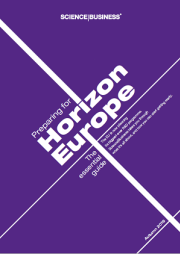The EU is now planning its biggest-ever R&D programme. Science|Business, drawing on its independent news coverage, takes you through what it’s all about, so you can start preparing
Buy the PDF report - € (unset)

This report has 116 pages.
Print copies
This report is also available in print for €75+VAT in Europe, €85+VAT rest of world. Print copies will be delivered within 10 days.
You can place your order at [email protected]
About the report
Around the world, research and development matter more than ever. In the past 15 years, global R&D spending has more than doubled, past $1.85 trillion, according to UNESCO. The number of full-time researchers has tripled, to 14.5 million. The results are in our faces every day: social media, new medicines, wind turbines and much more. So too are the social and economic impacts, from destabilising Twitter tirades to longer life expectancies.
With all this money and effort has come a massive change in the way we do science and technology – and the European Union’s huge R&D programmes are an important part of that. They have taken a policy idea – that Europe will be stronger and more peaceful if its people trade and work together – and turned it into a financial engine that drives labs in thousands of universities, multinationals and start-up companies across Europe. Today, we worry that these ties may be fraying for a host of political reasons. But if they hold firm, no small reason will be the fact that a tech job in Munich now depends on continued good relations with a lab in Barcelona and a customer in Manchester. And this geopolitical impact of Horizon will soon expand internationally, with the EU planning new R&D deals with Canada, Japan and other tech powers far from Brussels.
That’s the big picture of Horizon. The daily reality is more basic: universities, companies and public labs across Europe now depend on this programme. As a result, even though legislation for the next edition, Horizon Europe, isn’t yet finished, thousands of research committees and strategy meetings across the continent have already begun poring over the programme’s likely details: who can join, under what terms, on what topics, with what return. Many are already planning new R&D projects and partnerships.
Science|Business, a Brussels-based media and communications company specialised in R&D policy, has been following all these developments in its highly regarded online news service. In this 116-page publication, we combine our analysis and coverage of Horizon Europe to help you prepare for the start of the programme on 1 January 2021.
Table of contents
1. What’s in Horizon Europe?
- An overview of the content of the programme
- The structure of horizon Europe
- Pillar I: Excellent science
- Pillar II: Global challenges and European industrial competitiveness
- Pillar III: Innovative Europe
- Part 4: Widening participation and strengthening the European research area
2. Missions and partnerships
- What’s a mission?
- News: How the missions should be run
- News: Who’s who on the mission boards
- Focus: Imagining a mission on cancer
- What’s a partnership?
- What will the partnership topics be?
- News: EU member states put 9 new partnership ideas on the table
- Focus: Semiconductor industry seeks greater horizon support
- Focus: Above us only (a single European) sky
- Preliminary list of candidates for European partnerships
3. Horizon Europe’s funding agencies
- The European Innovation Council
- News: Ireland’s chief scientist: ‘we need to be brave’
- News: Can the EU become a hot-shot tech investor?
- News: A look at some of the EIC pilot grantees
- The European Research Council
- News: Top ERC official retires, citing ‘controversial’ changes
- News: Angela Merkel made private appeal to support ERC
- News: Commission appoints nanoscientist as new ERC president
- News: EU research funds disappear into a black hole
- News: ERC makes move to promote commercialisation
- The European institute of innovation and technology
- News: Barcelona, Greek university to lead new EIT network
4. East vs. west and Horizon politics
- ‘It’s about the respect’
- News: Croatia wants EU to take brain drain ‘more seriously’
- Focus: Time to narrow the performance gap in EU
- Focus: East favours cohesion over research in next budget
5. Open to the world?
- News: EU promises ‘flexible’ deals for foreign partners
- Focus: What the world wants from Horizon Europe
- News: ‘A loss for both sides’ if swiss excluded
- News: Canada circles Horizon Europe
- News: Paquet pitches Horizon Europe to Australia
- News: Japan and the EU: to the moon together?
- Focus: A brief reminder of how Brexit will affect EU and UK science
- News: Delay in talks for non-EU countries wanting to join
6. The practical details: How to join
- Who can participate?
- How to apply
- How are grants awarded?
- What’s covered?
7. Who will steer Horizon Europe into port?
- News: Friend to bees and techies: the EU’s new horizon chief
- News: EU research department aims to break bureaucratic silos
- Meet the new faces of the European parliament’s research committee
- Viewpoint: ‘We are afraid of our own champions’

 A unique international forum for public research organisations and companies to connect their external engagement with strategic interests around their R&D system.
A unique international forum for public research organisations and companies to connect their external engagement with strategic interests around their R&D system.